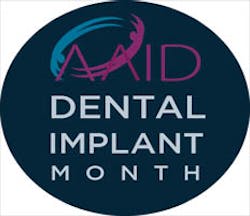AAID announces that August is Dental Implant Month
According to the Centers for Disease Control NHANES Study, more than 120 million Americans are missing one or more teeth, and 35–36 million Americans are missing all of their teeth in one or both jaws.
Dental implants are often the best treatment for missing teeth and are the closest you can get to a healthy, natural smile. They restore the ability to confidently eat, smile, laugh, talk, play, and enjoy all regular activities of everyday life.According to the Centers for Disease Control NHANES Study, more than 120 million Americans are missing one or more teeth, and 35-36 million Americans are missing all of their teeth in one or both jaws. The American Academy of Implant Dentistry (AAID) has designated August as Dental Implant Month. The AAID provides information to those who are missing teeth about the various treatment options available. The AAID is home to dental implant experts, who can provide surgical, restorative, or both phases of treatment. This makes the patient's experience more seamless. A dentist's affiliation with the AAID is a sign that he or she is devoted to improving patient lifestyles by replacing missing teeth.
Members of the AAID host events and activities in their local communities for those interested in learning more about their options to improve their lifestyles by replacing mission teeth. Patients are encouraged to seek out a dental implant expert...a member of the American Academy of Implant Dentistry.
Founded in 1951, the AAID was the first organization in the United States dedicated to developing and improving dental implants. Today, after 65 years, the AAID continues to be regarded as the leading organization of dentists devoted to providing dental implant treatment solutions. The AAID implant dentistry credentialing program is the only one in the U.S. that has been found to be bona fide by the state and federal courts.
Source: American Academy of Implant Dentistry press release, 14 July 2016
RELATED READING:
AAID releases comprehensive implant dentistry benchmarking study
Have infection, will travel—Paving the path to dental implant failure

